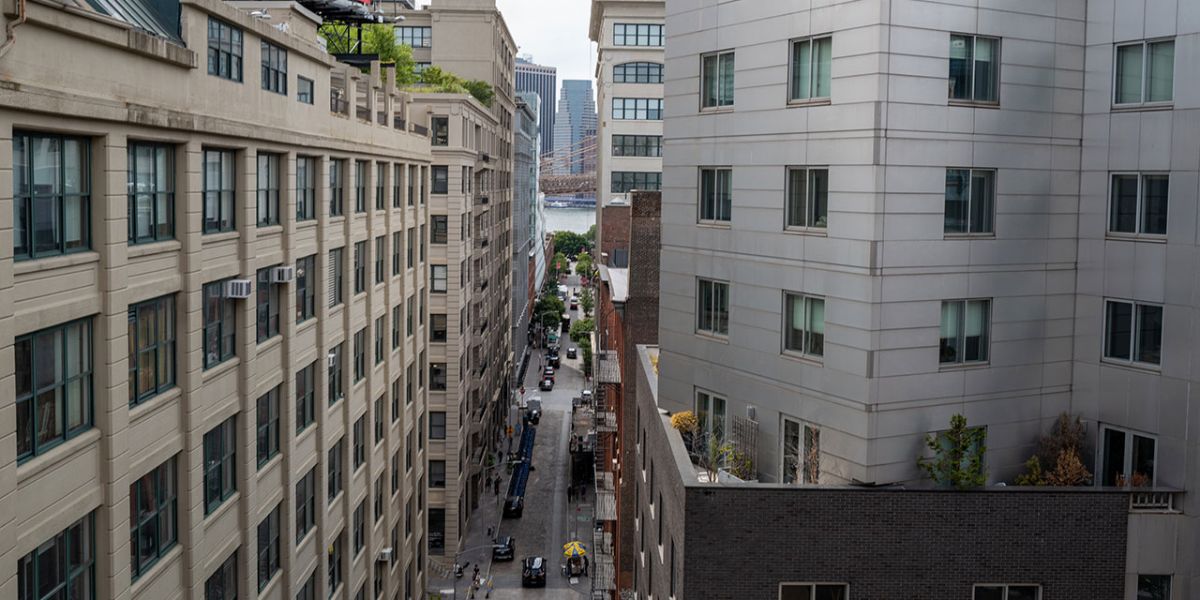In New York City, housing-court justice isn’t blind. Acknowledging that tenants often hold weaker bargaining power than landlords, the city has some of the strongest tenant-protection laws in the country—providing low-income renters with free legal representation, emergency rent assistance, and arbitration services.
But some tenants treat these policies as a license to stop paying rent, dragging landlords into interminable legal disputes. The city’s housing courts are straining under the weight of 150,000 new cases each year.
This dysfunction, with its delays and mounting costs, is hurting New Yorkers. The system isn’t fair to landlords—especially small ones—many of whom were only able to finance their homes by renting out additional units. It isn’t fair to honest tenants, who end up absorbing these costs through higher rents and barriers to entry. And it isn’t fair to New Yorkers as a whole, who suffer when police get swept up in housing disputes they are ill-positioned to address.
New York must reform its housing courts: hire more judges and staff, create expedited procedures for small landlords, and strengthen protections against bad-faith litigation.
Ilona Itskov, who owns a three-unit home in Brooklyn, is just one of many New Yorkers trapped in the city’s housing court hell. For more than five years, she claims to have endured two “nightmare” tenants, who refused to pay rent and lodged hundreds of false reports with the New York City Department of Housing Preservation and Development (HPD).
After her sister moved out-of-state and her mother died in 2021, Itskov said, she sought to rent out her two now-vacant units. “I had real compassion,” she said of her tenants, a mother and daughter. “This lady, she reminded me a lot of my own mother, and I wanted to help her out.”
But one year in, the relationship turned sour when the pair allegedly stopped making rent payments. “It’s hard to evict people in the city, and I wanted to give them a chance,” Itskov noted. The tenants didn’t seem to be facing any immediate financial difficulties, she said. “I would see them taking yellow cabs two, five, sometimes ten times a day. . . . They would be bringing these high-end appliances in, appliances that even I could not afford. . . . That’s when I said enough was enough.” Itskov began eviction proceedings. Four years on—and with zero rent collected—she has yet to retake possession. “It has completely taken over my life,” she said.
Itskov’s story also shows how housing court delays often end up wasting police resources. Officers were repeatedly called to respond to her tenant’s complaints, often in the middle of the night. “I would wake up at 2 a.m. to show the NYPD that my boiler was on,” she said. “They would leave after realizing the calls were bogus—then it would happen again at 4 a.m. when the next shift arrived.” Now in her seventies, Itskov struggles to climb the three flights of stairs to access the boiler, making the ordeal even more exhausting.
Asked why she doesn’t just offer the tenants a payment to vacate the unit—a strategy known as “cash for keys,” she responds: “That is exactly what my lawyers tell me. They tell me the easiest way to get them out would be to forgive several years in foregone rental income.” Those arrears now total about $100,000.
In the Soviet Union, where Itskov and her family emigrated from in the early 1980s, “they told you outright that you couldn’t own property,” she said. “But at least they were honest about it. Here, they tell you that you can—and then they destroy you for trying.”
While Itskov has managed to shoulder the legal costs of her eviction fight so far, others are less fortunate. Kat Agostini, of Jamaica, Queens, inherited a small family house after her mother’s passing. She has now found herself in a similar drawn-out legal battle, seeking to evict her sister and sister’s boyfriend from the second floor-unit of her home.
Like Itskov’s tenants, the pair’s unwillingness to pay rent does not seem motivated by need. In fact, the couple made news last year when the New York Post reported that they had found a safe containing $100,000 on a fishing trip.
Agostini’s woes began, she said, after her tenants dumped toxic chemicals down the drain, damaging the unit. She said she provided notice that the tenants would need to vacate for ten days to allow for repairs—and offered to find accommodation for them during that time—but they refused. A year and a half later, Agostini said she is out tens of thousands of dollars and no closer to securing an eviction.
At housing court with her lawyer, she claimed, she was informed that her tenants were automatically afforded a second hearing. At that point, Agostini was unable to keep paying the legal bills; she now represents herself.
A recurring theme in housing court is tenants gaming the system by filing false or exaggerated complaints. That was Agostini’s experience. “I’ve had the HPD used against me several times,” she said. “I was even arrested over false accusations that had no real proof.”
The costs go far beyond emotional stress and hours wasted in court. The loss of rental income, Agostini explained, left her unable to make needed repairs—forcing her to live with broken plumbing and even sanitary waste backing up into her own unit. “We have a roof over our heads,” she said, “but we’ve had to go hungry and do without laundry at times.”
Her most realistic option now, she believes, is to sell the house at “a massively undervalued price” and move to Long Island. “I feel so failed by a city I’d like to think I’ve supported,” Agostini said. “I’m a proud New Yorker . . . and I feel let down by it.”
Even those who succeed in removing problematic tenants are often left with lasting financial and emotional scars. That was the experience of Quin Mi, who purchased a multiunit building in 2019—only to find herself locked in a years-long legal battle with tenants who refused to leave after their lease had expired.
According to Mi, these renters fit the description of so-called “professional tenants”—people who know the ins and outs of the housing system, understand its weak points, and exploit them to their advantage.
For more than four years, Mi said, her tenants—who themselves managed properties and thus understood city housing regulations—manufactured HPD claims, frequently called 311, and refused inspections. Amid this dispute, Mi told me, she was beset by a debilitating case of Lyme disease, causing her to feel like there were “needles and thousands of bees” under her skin.
“Cash for Keys” again seemed like the only viable option to vacate the unit. “They demanded $90,000 to move out . . . eventually said at least $50,000,” Mi said. She refused, considering she had suffered more than $109,000 in damages, legal fees, and unpaid rent.
Ultimately, after five years of back and forth, while also battling illness, Mi was relieved to find that her delinquent tenants had vacated the unit. But that was only after the ceiling had fallen through, due to the repairs she said the tenants had refused to permit.
Mi recognized that she will probably never recoup the six-figure losses from damage to the unit. Added to that is “immeasurable” emotional damage.
Most New York landlords aren’t being exploited by their tenants. But in a city with some of the strongest tenant protections in the country, a small but costly minority are gaming the system—abusing legal safeguards and overwhelming the city’s backlogged housing courts. New York policymakers should make fixing this a priority: speed up case processing, strengthen safeguards against bad-faith claims, and restore basic fairness to a system that’s failing both landlords and honest renters.
Fortunately, officials are increasingly aware of the problem. In April 2025, the New York State Bar Association Real Property Section’s Housing Subcommittee published a report underscoring the harm caused by housing court delays. “The average time for disposition may be as long as 15 months,” it noted. Instability, legal costs, and housing-market distortions are only a few of the problems mentioned.
The report recommended expanding access to the Small Property Owner Part of the city’s housing courts—currently limited to owners of one- to three-family homes—to include owner-occupied properties with up to six units. It also urged New York State to follow through on its 2018 commitment to appoint ten additional housing court judges—five have been seated so far—to help clear the backlog of 150,000 pending cases.
There are other bottlenecks. Remote work continues to slow case processing, and clerks and support staff remain in short supply. Moreover, as noted in the subcommittee’s report, New York’s Universal Access to Justice Program—which provides free legal counsel to low-income tenants—has also caused delays as court hearings get adjourned to determine whether tenants are eligible. Appointing counsel to those who are eligible before the first court hearing would speed up proceedings.
The system also needs stronger safeguards to prevent tenants from filing fictitious HPD complaints as retaliation against landlords seeking legitimate rent. Some form of penalty on tenants who file multiple false claims, as currently exists for landlords seeking third and subsequent re-inspections after they have been found in violation, could be one effective solution.
Ideally, however, lengthy court proceedings could be bypassed entirely through mediation. The state bar association’s subcommittee report recommends expanding mediation to make it mandatory before court hearings. This solution is not appropriate in all cases and could cause further delays. But providing tenants and landlords with the option of binding mediation could work in simpler cases, freeing up capacity in the city’s housing courts.
Whether these reforms can end New York’s housing court crisis depends on whether city and state officials are willing to act. One thing is clear: if New Yorkers want a fair and functional housing system, change is long overdue.




